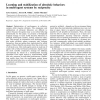Free Online Productivity Tools
i2Speak
i2Symbol
i2OCR
iTex2Img
iWeb2Print
iWeb2Shot
i2Type
iPdf2Split
iPdf2Merge
i2Bopomofo
i2Arabic
i2Style
i2Image
i2PDF
iLatex2Rtf
Sci2ools
BC
1998
1998
Learning and stabilization of altruistic behaviors in multi-agent systems by reciprocity
Optimization of performance in collective systems often requires altruism. The emergence and stabilization of altruistic behaviors are dicult to achieve because the agents incur a cost when behaving altruistically. In this paper, we propose a biologically inspired strategy to learn stable altruistic behaviors in arti®cial multi-agent systems, namely reciprocal altruism. This strategy in conjunction with learning capabilities make altruistic agents cooperate only between themselves, thus preventing their exploitation by sel®sh agents, if future bene®ts are greater than the current cost of altruistic acts. Our multi-agent system is made up of agents with a behavior-based architecture. Agents learn the most suitable cooperative strategy for dierent environments by means of a reinforcement learning algorithm. Each agent receives a reinforcement signal that only measures its individual performance. Simulation results show how the multi-agent system learns stable altruistic behaviors,...
| Added | 21 Dec 2010 |
| Updated | 21 Dec 2010 |
| Type | Journal |
| Year | 1998 |
| Where | BC |
| Authors | Javier Zamora, José del R. Millán, Antonio Murciano |
Comments (0)

